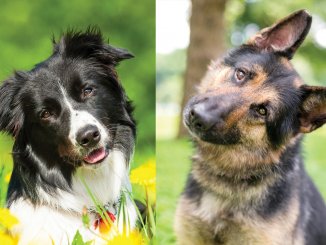The corgi German shepherd is a crossbreed mix between a corgi and a German shepherd. They are also commonly referred to as corman shepherds, German corgis, and German shepherd corgis.
Corgi German shepherd mixes are 12–15 inches tall and weigh 25–70 pounds. This breed is friendly, energetic, and strong-willed with a keen guarding instinct and fierce loyalty to its owners. The average lifespan of a corgi German shepherd is 12–15 years.
Corgi German shepherd mixes typically cost $250–$750.
TABLE OF CONTENTS
Corgi German Shepherd Mix Characteristics & Overview

| Common names: | Corgi German shepherd, corman shepherd, German corgi, German shepherd corgi |
| Origin: | Unknown |
| Parent breeds: | Corgi and German shepherd |
| Breed group: | Hybrid |
| Size: | Small–medium |
| Height: | 12–15 inches |
| Weight: | 25–70 pounds |
| Colors: | Black, brown, gold, tan, and white |
| Coat: | Double coat, medium length |
| Life expectancy: | 12–15 years |
| Temperament: | Friendly, energetic, loyal, watchful |
| Shedding: | Moderate shedder |
| Barking tendency: | High |
| Cost: | $250–$750 |
Origin & Purpose
The origin of the corgi German shepherd mix is unknown. It’s likely that the corgi German shepherd mix was bred primarily for the cuteness of combining the two breeds, and for the training benefits of mixing two of the smartest dog breeds.
Parent Breeds
The corgi German shepherd mix is a cross between a corgi and a German shepherd. The mixed-breed offspring inherits unique traits and characteristics from each of them.
Corgi
The Welsh corgi is a herding dog originating in Wales, dating back to 1925. Corgis were bred as herding dogs and later became popular family companions, especially when the dogs were introduced into the British Royal Family in 1944.
Corgis have sable, red, fawn, or black double coats, with short legs, pricked ears, and sturdy bodies. They are loyal, loving, intelligent, and playful.
German Shepherd
The German shepherd is a German working dog, first bred in 1899 from traditional herding dogs. These dogs were originally used for herding sheep, but they now work in public service and are also kept as companion dogs.
German shepherds are large dogs with red/black or tan/black short-to-medium fur, square muzzles, and triangular, erect ears. They are smart, confident, loyal, and alert, with a stubborn streak.
Lifespan
The average lifespan of the corgi German shepherd mix is 12–15 years. The dog’s diet, activity level, and health status affect its expected lifespan.
Healthy, active dogs are likely to live longer than unhealthy, sedentary dogs.
Corgi German Shepherd Mix Appearance

The corgi German shepherd has a corgi size and body type, and the head, markings, and tail of a German shepherd. These dogs have stocky bodies and short- to medium-length fur.
Height and Weight
Corgi German shepherds are considered small to medium dogs, with a height at the withers of 12–15 inches, and a weight of 25–70 pounds.
The weight and height of this designer breed vary depending on whether the dog takes more genes from its German shepherd or corgi parent.
Most corgi German shepherds are corgi-sized, but some dog mixes have a medium-sized German shepherd build.
Colors
Corgi German shepherds are typically red and black or tan and black, like the German shepherd. Some have patches of white on their chests and paws. Fawn and white is a particularly rare color combination.
Coat
The corgi German shepherd mix has a medium-length double coat. Its undercoat is a dense, soft layer of fur, and its topcoat is coarse, wiry, and weather-resistant.
These dogs have wavy or straight coats, with thick fur on the back of the neck, and long tufts of fur on the ears and behind the legs. They are seasonal shedders with high shedding tendencies.
Head and Facial Features
Corgi German shepherds have the flat head shape of a corgi and the long, square muzzle and black nose of the German shepherd. They have erect ears and expressive, almond-shaped eyes.
Personality and Temperament

According to the American Kennel Club, the corgi is kind, affectionate, smart, and bold. Meanwhile, the German shepherd is confident, eager, fearless, and alert. German shepherd corgis have a combination of these parent traits — they’re intelligent, energetic, loyal dogs with high-spirited personalities.
German shepherds are known to be stubborn and aloof with strangers, and this trait carries into the German shepherd corgi. The breed mix is also prone to separation anxiety, which is passed down from the corgi. For this reason, corgi German shepherds are best suited to people who are usually at home and have the time to give their dog attention.
Barking
German shepherds and corgis both have high barking tendencies. German shepherds bark to protect and alert their owners to potential dangers, and corgis bark in all situations — because they’re bored, hungry, excited, annoyed, or warning their owners about something.
Because of their parents’ excessive barking, these dogs have a high likelihood to bark excessively, too. They can be trained to minimize barking if needed.
Corgi German Shepherd Mix Care

Caring for a corgi German shepherd involves feeding the dog a healthy diet, regularly grooming the dog, and providing the dog suitable exercise. Taking care of this breed is easy because the dog isn’t high-maintenance or prone to many health conditions.
Food Needs
Feed a corgi German shepherd mix between two and three cups of kibble per day. Choose a quality, nutritious food brand and make sure not to overfeed the dog, because these dogs are prone to obesity.
Provide the right food for your dog’s age group — puppy food for puppies, adult food for adults, and senior food for seniors — to provide the dog with the right balance of nutrients for its stage in life.
Grooming Needs
The corgi German shepherd’s coat is thick and plush, and requires brushing twice or three times per week. During shedding season in the spring and fall, brush your dog’s coat every day to remove excess stray hairs, remove tangles, and keep the coat smooth and glossy.
Corgi German shepherds should be bathed every two or three months. The dog’s teeth should be cleaned three times per week, and its nails should be trimmed once a month.
Exercise Needs
Provide between one and two hours of exercise per day for corgi German shepherds. Although the dogs are small and suitable for homes without backyards, they have lots of energy to burn and enjoy a range of outdoor activities, including hiking, swimming, and running.
This breed excels in activities like agility and tracking events, so consider enrolling your dog in local training classes or competitions for a different, exciting form of exercise.
Mental Needs
The corgi German shepherd is an intelligent breed that loves human attention and requires at least one hour of daily mental stimulation. Tug toys, tennis balls, and frisbees are all good toys for bonding with your dog and meeting their mental needs.
Interactive puzzle toys, especially puzzle treat toys, are ideal for keeping a corgi German shepherd entertained while you can’t play with your dog one-on-one. Just make sure the dog doesn’t eat too many treats.
Common Health Concerns
Corgi German shepherds are healthy dogs that avoid many of the health issues that their parent breeds are prone to. However, the dogs are still susceptible to several common health conditions:
- Back and joint problems such as hip dysplasia: These conditions occur due to the dog’s short legs and elongated body. Treatment includes weight maintenance, exercise, medication, and surgery, depending on the severity of the condition.
- Eye inflammation: Eye inflammation causes redness and teary eyes, and is usually a symptom of an eye problem like conjunctivitis, glaucoma, or allergies. Medicated eye drops are a common treatment for eye inflammation.
- Bloat: Dogs with deep chests, such as corgi German shepherds, have an increased likelihood of bloat, a life-threatening disease that causes the stomach to twist. Bloat can be prevented by feeding your dog a healthy diet of small meals.
- Obesity: Because of their small size, corgi German shepherds put on weight quickly. Obesity can be prevented by feeding your dog the right amount of food and reducing the dog’s food intake if unhealthy weight gain occurs.
- Gum disease: Gum disease is one of the most common dog diseases, caused by bacteria that damages the gums and supporting structures around the teeth. Prevent gum disease by regularly brushing your corgi German shepherd’s teeth.
To reduce the risk of health conditions in your corgi German shepherd, buy the dog from a reputable breeder with proof of health screening for both the parent dogs.
Training

Corgi German shepherds are intelligent, eager to please, and quick learners, but have a stubborn streak and are known to push boundaries. Depending on the dog’s disposition, training can be challenging, especially for inexperienced dog owners.
Socialize your dog with other dogs and people from an early age, and start training your dog as soon as possible.
Begin with basic training, including leash training, toilet training, and teaching your dog to “sit,” “down,” and “stay,” before moving on to more advanced commands. Consistency, positive reinforcement, and treats are good strategies for successful training.
Corgi German Shepherd Mix Price
The corgi German shepherd mix is priced as a mid-range dog. The cost depends on whether you buy from a breeder or adopt the dog.
How Much Is a Corgi German Shepherd Mix?
A corgi German shepherd costs $250–$750. Several circumstances affect the price of a corgi German shepherd, including the dog’s age (puppies are about $300 more expensive than adults), the rarity of the dog’s colors and markings, and whether you buy or adopt the dog.
Adoption fees are typically about $200.
How Much Does it Cost to Own a Corgi German Shepherd Mix?
The monthly cost of owning a corgi German shepherd is $30–$50, depending on whether you buy mid-range or expensive products for your dog.
Food, grooming and walking supplies, healthcare, and new toys contribute to the monthly cost of owning a dog. Training and dog sitting are other costs to consider.
Is a Corgi German Shepherd Mix Right for You?
Corgi German shepherd mixes are intelligent, affectionate dogs that are ideal for families. However, this dog may not be suitable for some people or lifestyles.
Who Should Get a Corgi German Shepherd Mix?
Corgi German shepherds are lively dogs that love attention, making them ideal for people looking for a single pet they can spoil. These dogs have nurturing, protective natures, so they’re good dogs for families with children.
Although the corgi German shepherd is an active dog, its small size makes it suitable for apartment living. These dogs are best suited to owners with active lifestyles, who can take their dog on daily walks and hikes.
Who Should NOT Get a Corgi German Shepherd Mix?
Some corgi German shepherds are difficult to train and get set in their ways, so they aren’t suitable for people who don’t have the time or patience to properly train a dog from puppy age.
This breed has high exercise needs, so they’re not a good fit for inactive people or people with mobility issues. These dogs thrive on human interaction, so they’re not suitable for people who are often away from home, and can’t provide their dog with love, attention, and mental stimulation.
More Pembroke Welsh Corgi and German Shepherd Mixes
Want a Pembroke Welsh Corgi mix or German Shepherd mix but aren’t keen on the Corgi German Shepherd mix? Check out these other hybrid dog breeds:
Pembroke Welsh Corgi Mixes
German Shepherd Mixes
- German Shepherd Husky Mix
- Australian Shepherd German Shepherd Mix
- German Shepherd Poodle Mix
- German Shepherd Wolf Mix
- Border Collie German Shepherd Mix
- German Shepherd Rottweiler Mix
- German Shepherd Boxer Mix
- Great Pyrenees German Shepherd Mix
- German Shepherd Beagle Mix
- German Shepherd Golden Retriever Mix
- Golden Shepherd
- German Shepherd Pitbull Mix
- German Shepherd Lab Mix








I would very much like to find Sources for these dogs!! We’ve been searching for months for one!!
Momads2
Rio Rico AZ